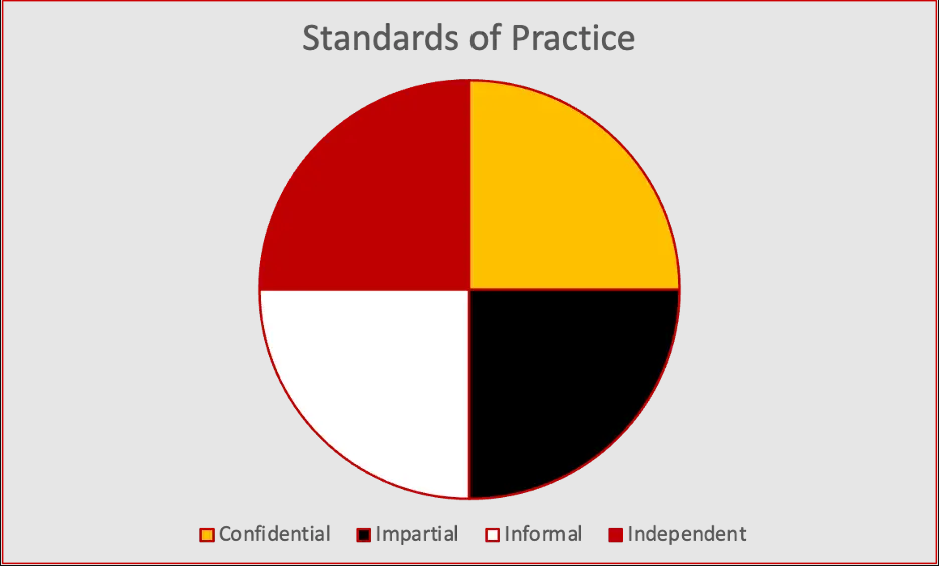Graduate Student Ombuds Office
The University of Maryland provides ombuds services for faculty, staff, graduate students and undergraduate students. University of Maryland Ombuds Services for faculty, staff, and graduate students are administered through the Office of the President. An ombuds is a person who can be consulted by members of the university community who want information about University policies relating to their activities or who encounter problems that they cannot resolve through ordinary means (e.g., student to faculty member, staff to supervisor, faculty member to department chair). An ombudsperson listens to concerns, brainstorms strategies to address the concerns, provides resources and information, and tries to assist in addressing the concerns. The ombuds follow the standards of practice outlined by the International Ombuds Association.
Contact the Graduate Ombudsperson: grad-ombuds@umd.edu

The Ombudsperson is an impartial, independent and confidential resource for graduate students at the University who helps to surface and resolve school issues. The Ombudsperson can also help to affect positive change by providing upward feedback on patterns of problems and complaints to appropriate senior officers.
The word “Ombudsman” originated in Sweden during the 19th Century, when the term applied to a public official appointed to investigate citizens’ complaints against governmental agencies. The Ombudsperson is best described as “the person who has an ear to the people.” The purpose of the Ombuds Office is to insure that the graduate student voice is heard, and that problems can receive impartial attention.
The Ombudsperson listens to your concerns, clarifies procedures, discusses options, and, when requested, may act as an intermediary. The Ombudsperson does not advocate for an individual. Rather, the Ombudsperson advocates for a fair process. The Ombudsperson works to promote the University’s commitment to excellence in graduate education.
An Ombuds officer is confidential.
Communications with an Ombuds are confidential and no information or opinion presented to an Ombuds (or even the fact that the Ombuds has been contacted) will be passed on to other parties without the express permission of the complainant. The only exceptions to confidentiality are when there appears to be imminent risk of serious harm to self or others, or if required by law, litigation, or University policy (e.g., sexual misconduct, child/elder abuse, or criminal activity).
- Hear complaints and grievances.
- Help individuals candidly discuss issues and explore options.
- Open channels of communication.
- Serve as a neutral third party in conflict resolution.
- Work to achieve fair and equitable solutions to problems.
- Make referrals to appropriate University resources, so that you can go directly to the person who can best address your concerns.
- Suggest approaches for addressing and managing conflict.
- Collaborate with other University offices on issues of general concern.
- Help obtain interpretations of University policies.
- Offer recommendations for policy and procedure change.
Confidentiality. The Office is firmly committed to maintaining the confidentiality of those who use our services. The Ombudsperson will not identify you or pass on your confidences to anyone without your permission, but there are exceptions. The only exceptions to confidentiality are when there appears to be imminent risk of serious harm to self or others, or if required by law, litigation, or University policy (e.g., child/elder abuse or criminal activity). Please note that the Ombuds officer is a mandatory reporter and must report instances of sexual misconduct to the Office of Civil Rights & Sexual Misconduct (OCRSM).
We keep no official records of visitors’ names, affiliations, or concerns. If you wish for a problem or complaint to go on record, we will refer you to the appropriate office or person.
Neutrality. The Ombudsperson does not take sides, but considers the interests and concerns of all parties to disputes, with the goal of achieving fair outcomes. The Ombudsperson does not arbitrate, adjudicate, testify, or participate in any formal grievance process.
Independence. The Ombudsperson is outside the usual administrative structure of the University. The Ombudsperson reports to the Associate Provost and Dean of the Graduate School, and is authorized to work with all members of the University community to resolve problems.
Flexibility. The Ombuds Office provides an alternative to the formal grievances and complaint process.
The Office emphasizes non-adversarial problem-solving options, rather than formal, rights-based options. While formal processes are appropriate in many situations, they emphasize pursuing justice through rules and regulations. Problem-solving options go beyond seeking justice to address underlying issues that may have given rise to disputes, so that future disputes can be avoided.
We adhere to The Ombudsman Association Code of Ethics.
We base our practice on confidentiality. We assert that there is a privilege with respect to communication with the ombudsman and we resist testifying in any formal process inside or outside the organization. Please note that the ombuds officer is a mandatory reporter and must report instances of sexual misconduct to the Office of Civil Rights & Sexual Misconduct (OCRSM).
We exercise discretion whether to act upon a concern of an individual contacting the office. An ombudsman may initiate action on a problem he or she perceives directly.
We are designated neutrals and remain independent of ordinary line and staff structures.
We serve no additional role (within an organization where we serve as ombudsman) which would compromise this neutrality.
We remain an informal and off-the-record resource. Formal investigations--for the purposes of adjudication--should be done by others. In the event that an ombudsman accepts a request to conduct a formal investigation, a memo should be written to file noting this action as an exception to the ombudsman role. Such investigations should not be considered privileged.
We foster communication about the philosophy and function of the ombudsman's office with the people we serve.
We provide feedback on trends, issues, policies, and practices without breaching confidentiality or anonymity.
We identify new problems and we provide support for responsible systems change.
We keep professionally current and competent by pursuing continuing education and training relevant to the ombudsman profession.
We will endeavor to be worthy of the trust placed in us.
Additional Resources:
Visit the Students Support section of our website learn about more services available to graduate student.

